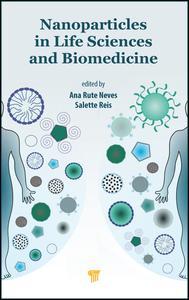Description
Nanoparticles in Life Sciences and Biomedicine
Authors: Rute Neves Ana, Reis Salette
Language: English
Subjects for Nanoparticles in Life Sciences and Biomedicine:
Keywords
Alexandre C. Vieira. Amalia S. Jurado. Ana C. R. Joyce Coutinho. Ana L. Cardoso. Ana M. Cardoso. Ana Raquel Madureira. Andreia Almeida. Andreia Granja. administration. Bruno Sarmento. based. Catarina Pereira-Leite. Claudia Azevedo. Claudia Nunes. Clia Nunes. Daniela Lopes. Daniela Ribeiro. Daniella Silva. David S. M. Ribeiro. Diana Rafael. Domingos Ferreira. delivery. drug. Eduarda Fernandes. Felix Carvalho. Fernanda Andrade. Iolanda M. Cuccovia. Joana Magalhães. Joao L. M. Santos. João Albuquer
Approximative price 171.15 €
In Print (Delivery period: 15 days).
Add to cart· 15.2x22.9 cm · Hardback
Description
/li>Contents
/li>Readership
/li>Biography
/li>
The creation of new and more efficient therapies for improving human health greatly depends on drug delivery systems. Nanotechnology has emerged as a powerful strategy for the development of nanoparticles, such as nanoemulsions, liposomes, nanocrystals, and nanocomplexes, applied in the diagnosis, treatment, or theranostics of several pathologies and diseases. This book reviews the most recent research and development in nanotechnology and, following a multidisciplinary approach, presents new strategies for drug delivery, including aspects from chemistry, physics, biology, and imaging methodologies and exploiting several administration routes, internalization pathways, site-specific delivery strategies, and the potential cytotoxicity of nanoparticles.
Beginning with a description of the importance and application of nanotechnology for enhancing existing therapy, the book moves on to detailing oral, topical, pulmonary, brain, cancer, and anti-inflammatory drug delivery approaches; gene delivery approaches; theranostic approaches; and nanoparticle cytotoxicity. Practical and user friendly, it is suitable for advanced undergraduate, graduate, and postgraduate students of nanoscience and nanotechnology; researchers in nanoscience, nanotechnology, chemistry, biology, biochemistry, pharmaceutical sciences, medicine, and bioengineering, especially those with an interest in drug delivery or theranostics; and academia and university readership.
Introduction. Oral drug delivery approaches. Topical drug delivery approaches. Pulmonary drug delivery approaches. Brain drug delivery approaches. Cancer drug delivery approaches. Anti-inflammatory drug delivery approaches. Gene delivery approaches. Theranostic approaches. Cytotoxicity.
Ana Rute Neves is a postdoctoral researcher at the Molecular Biophysics and Biotechnology Unit of the Rede de Química e Tecnologia (REQUIMTE) research center, Faculty of Pharmacy, University of Porto, Portugal. She obtained her bachelor’s and master’s degrees in biochemistry from the Faculty of Sciences and Abel Salazar Biomedical Sciences Institute, University of Porto, in 2007 and 2009, respectively, and her PhD in pharmaceutical sciences from the Faculty of Pharmacy, University of Porto, in 2015. She is the author of several peer-reviewed articles in international journals, one paper in a science dissemination journal, one conference proceeding, and four invited book chapters and the editor of one book series. She also has one submitted patent. Currently, Dr. Neves is an executive researcher for two ongoing funded R&D projects (FCT and Norte 2020). Her research focuses on biophysical and biochemical approaches to studying the interaction of phytochemicals with biomembranes and the development of nanoparticles as drug delivery systems to create new and more effective therapies for a range of diseases and administration routes.
Salette Reis is director of the Department of Chemical Sciences and group leader of the Molecular Biophysics and Biotechnology Unit, REQUIMTE. She obtained her bachelor’s degree in pharmaceutical sciences and her PhD in analytical chemistry from the Faculty of Pharmacy, University of Porto, in 1984 and 1995, respectively. Dr. Reis is the author of almost 200 peer-reviewed articles in international journals and several book chapters and the editor of one book series. She has participated in several funded R&D projects as principal investigator. Her research focuses on biophysics and pharmaceutical chemistry in the use of biomimetic membrane models to study the effect of drugs on biological membranes and the development of nanocarriers for drug delivery.
These books may interest you

Cancer Nanotechnology 135.60 €



